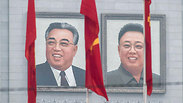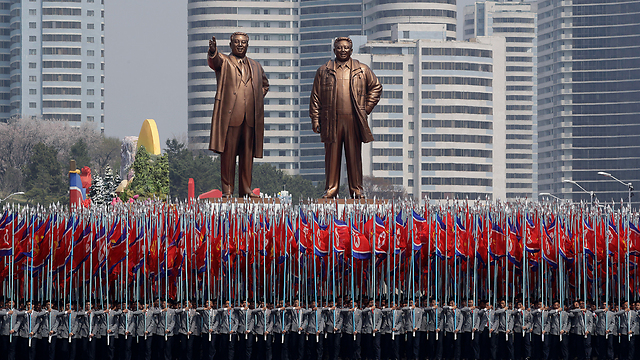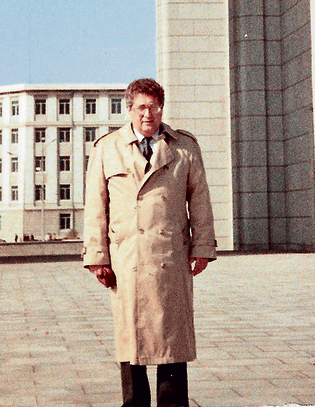
Israel’s missed opportunity with North Korea
Former Foreign Ministry Director-General Eytan Bentsur reveals Pyongyang’s repeated attempts to strike a deal with Jerusalem more than 20 years ago and how talks were eventually thwarted by the US. ‘It’s so easy to say there’s no partner,’ he says. ‘There was a window of opportunity, and we missed it. Now, North Korea is threatening world peace.’
In Seoul, the South’s capital, I met some of the top experts on the North’s politics. There was one thing they all agreed about: The regime in Pyongyang could have been tamed. As late Israeli statesman Abba Eban once said, on a different issue, an opportunity to miss an opportunity was never missed here.
Israel played a key role in one of these opportunities. It’s a fascinating story, filled with secret moves, international schemes and internal wars of ego. It deserves a thriller book, not just a newspaper column. “The affair is now on the history minister’s desk,” former Foreign Ministry Director-General Eytan Bentsur told me last week. “The verdict will be delivered by him.”

In 1992, Bentsur was in Washington as a member of the Israeli delegation to the peace talks with the Jordanian-Palestinian delegation. An American businessman, a distant relative of his, asked to meet him on an important matter. Bentsur traveled to New York to see him. It turned out that he was one of the owners of a Beijing-based company which had trade ties with North Korea. “There are people in the regime who are interested in a deal with Israel,” he said.
The motive was both economic and political: After the Soviet Union’s dissolution, the United States was perceived as the only world power, the supreme authority: The North Korean economy was on the verge of collapsing; the country’s founding father, Kim Il-Sung, was dying; his son, Kim Jong-Il was seen as a spoiled brat with no leadership skills, who spend his days and nights watching Hollywood movies. Senior government officials were seeking a lifeline.
The Israeli motive was security-related: A report prepared by the Mossad, Israel’s national intelligence agency, determined that North Korea was selling Scud missiles (known as “Nodong” in Korea) to Iran, Libya and Syria and cooperating with these countries in the development of a nuclear weapon. Israel would benefit from keeping North Korea away from the wars of the Middle East.
Bentsur reported the conversation to then-Foreign Minister Shimon Peres. Peres was intrigued: It was the kind of move that matched his thirst for secret channels and diplomatic adventures. We must update (then-Prime Minister Yitzhak) Rabin or he will thwart it, Bentsur warned. Peres updated Rabin, who supported the move.
As an opening move, the North Koreans suggested that Israel purchase a large gold mine in the Unsan county, rebuild it and renew the mining activities. The mine was bombed and taken out of service by the Americans during the Korean War. The suggested price was $30 million.
On September 29, 1992, Daesung Bank in Pyongyang issued a letter inviting the Beijing company to send over a survey delegation. The delegation arrived in Pyongyang on November 1. Its members included Eytan Bentsur, his assistant Avi Siton, Ruth Kahanoff (who currently serves as Israel’s ambassador to Japan) and geologists Amos Bein and Moshe Shirav.
They were given a royal reception. A North Korean general met the Israelis in Beijing. A North Korean plane took them to Pyongyang. They stayed in the official guesthouse. “You’re sleeping in the bed Yasser Arafat slept in,” Bentsur was told in an attempt to impress him (I had a similar experience in a guesthouse in Moscow in the USSR era).
The Mossad director at the time was Shabtai Shavit. Efraim Halevy was his deputy. The Mossad has certain ties with North Korea, through European elements. In the middle of the talks, the Foreign Ministry people found out that another Israeli just happened to arrive in Pyongyang—Efrain Halevy. The competition between the Foreign Ministry and the Mossad cast a heavy shadow on the future of the initiative.
The Koreans spoke about economic aid; the Israelis spoke about the missiles reaching Syria and Iran. At first the Koreans denied it, but they soon realized that if they failed to deal with the arms shipments, there would be no deal. The leader’s personal helicopter—a luxury helicopter, with flight attendants—took the delegation to the mine. It has potential, the geologists said, but the reconstruction will cost a fortune. The Foreign Ministry officials were more optimistic: They saw despair, almost a cry for help, in the North Koreans’ eyes. One of them, General Cha, kept initiating meetings even after the move ran aground.
At the conclusion of the talks, the North Koreas hosted a festive event for the Israelis, a colorful production with dozens of dancers. The Israelis were the only audience in an auditorium big enough for 5,000 people. They were then flown to Beijing in first-class seats.
Nothing to offer
On December 9, a dramatic meeting took place at the State Department building in Washington. The Israeli participants were Halevy, Bentsur and Michael Shiloh, the Israeli embassy’s chief of staff. Three State Department officials—Arnold Kanter, Mark Farris and Edward Jerjian—represented the American side. Halevy briefed the attendees on his meetings in Pyongyang. The Koreans expect Israel to bring America over. Bentsur suggested encouraging the moderate elements in the Korean leadership. The Americans curbed their enthusiasm. We have nothing to offer North Korea, they said. Be careful not to break bad, they told the Israelis.
A month later, the senior Mossad and Foreign Ministry officials met for a concluding discussion. Halevy said the Mossad had invited a top North Korean official to visit Israel. The message would be: Stop supplying countries in the region with long-range missiles. The chance that the message would be accepted was slim, especially in light of the American administration objection to the move.
Bentsur said his impression of the administration’s stance was different. In any event, a new president—Bill Clinton—was about to enter the White House. Even if his administration objected, Israel wouldn’t have to accept his authority in regards to existential issues.
By the way, Bentsur noted, Israel hasn’t severed its ties with China even though China is helping Iran with its nuclear program.
The decision was to pursue the talks on two parallel channels, but to avoid signing any contract before the Clinton administration formed its policy. Two days later, the Foreign Ministry received a letter signed by a minister in the North Korean government, inviting Foreign Minister Shimon Peres on an official visit. Foreign Ministry officials estimated that the Koreans would agree to open an Israeli office in Pyongyang.
The philosophy of the failure
The Foreign Ministry suggested that the mine’s reconstruction be performed by the Merhav company, owned by businessman Yossi Maiman. Billionaire Shaul Eisenberg, who had a lot of experience doing business in the Far East, entered the picture too.
In March 1993, Jewish American businessman Leslie Blond, one of the owners of the Beijing-based corporation, sent a letter to Nimrod Novik, then an executive at the Merhav Group. Blond protested the delays in Israel and threatened that the company would “move to different horizons.” Novik apologized and reminded Blond of the American objection. Blond wouldn’t give up: He demanded that Bentsur return to Pyongyang to discuss the overall relations.
The North Korea threat to walk away from the Nuclear Non-Proliferation Treaty was in the background. US Secretary of State Warren Christopher believed the threat could be removed through diplomacy. He was convinced that the Israeli initiative was disrupting the American negotiations. Foreign Ministry officials estimated that the CIA was behind his objection, and that the Israeli Mossad was behind the CIA’s objection.
Meanwhile, Blond succeeded in convincing officials in Pyongyang to meet Israel half way: They formed a three-member committee to discuss the weapon shipments to the region with Israel. There were two conditions for stopping the shipments, according to Blond: A special agreement of more than $1 billion and an investment plan in North Korea. In return, the Koreans would immediately recognize Israel and sustain close relations.

The Koreans wouldn’t let go: In May, a middleman on their behalf asked Prime Minister Rabin to put his demands in writing as soon as possible, in a bid to speed up the talks.
The letter was never sent. The Americans brought everything to a halt. Bentsur was instructed to tell the Koreans that the talks had been frozen and would only be resumed after the Koreans decided whether they were going to withdraw from the Nuclear Non-Proliferation Treaty. Blond suggested that Bentsur meet with the North Korean foreign affairs minister. General Cha telephoned Bentsur and told him the meeting had been approved by Kim Il-sung.
On June 11, North Korea announced that following the negotiations with the Americans, it had decided to suspend its decision to withdraw from the agreement. The International Atomic Energy Agency’s supervision of its nuclear facilities would be resumed. Secretary of State Christopher described the announcement as a historical achievement. The North Koreans disregarded the agreement. Today, the agreement with them is described as one of the most shameful failures of the Clinton administration.
On June 24, Bentsur met with a delegation led by General Cha in Beijing. The discussions lasted two days and focused on four issues: The missiles exported by North Korea, the gold mine, a $1 million loan and the establishment of full relations. The Koreans complained that information from the talks had been leaked and were disappointed when the Israelis didn’t show up to sign the contract. The Americans rushed to summon Bentsur to Washington and warn him not to continue the talks, which they said could create an illusion among the Koreans that they had options in the West even if they failed to uphold the nuclear agreement.
The North Koreans kept trying. They suggested a meeting in Paris in August. They said Kim Ill-sung had appointed his daughter Kim Kyong-hui and her husband Jang Song-thaek to represent him in the talks. Military experts would also be sent to Paris to discuss the missile issue.
The Americans vetoed the talks. Bentsur protested, saying he didn’t recall Israel ever asking for an American “approval” for its moves. His protest was rejected. The Americans announced that they wouldn’t consider the sale of Scud missiles to Iran and Syria as a violation of the nuclear agreement. This came as another blow to Israel.
There’s no guarantee that North Korea would have signed an agreement, and had it signed an agreement, there’s no guarantee it would have upheld it. Eytan Bentsur, who is 79 years old today, sees the initiative’s failure in philosophical terms: “The problem is that it’s so easy to say there’s no partner,” he says. “We said ‘there’s no partner’ about the Jarring initiative, we said ‘there’s no partner’ about Sadat—and we were hit with the Yom Kippur War. There was a certain window of opportunity, while one tyrant was dying and before another tyrant settled in, and we missed it. And now, North Korea is threatening world peace.”











